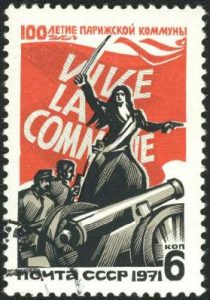The International Mass Communist Party Shall Be the Human Race
The Paris Commune of 1871 marked the first time in history that the working class, acting in its own class interests, took state power, if only for two months. It did not and could not – given the objective and subjective conditions at the time –fully achieve its goal of creating a new society in the communist vision that they held.
It nevertheless blazed new trails in our class’ struggle for its emancipation from capitalist exploitation, leaving invaluable lessons for future generations of communist revolutionaries.
On March 18, 1871, the Central Committee of the Paris National Guard proclaimed, “The proletarians of Paris have understood that it is their duty to render themselves masters of their own destinies by seizing upon the governmental power.
Unlike many radicals then and now, the Communards boldly declared that only the working class can liberate the working class. As they embarked on this path, increasing numbers saw that they needed to destroy the capitalist state apparatus. They saw and understood that its essence is armed violence against the masses to keep them exploited and oppressed.
Therefore, the very first act of the Commune Council was to declare that the National Guard (a workers’ militia) should replace the capitalists’ permanent armies, which were instruments of oppression.
Working-class women played a key role in every aspect of the Commune from its beginning to its final battles. They were political as well as military leaders. They were key in convincing soldiers in the government army to side with the Paris masses on March 18. Women helped build barricades and fought heroically to the end to defend them. Many times they led charges against the enemy.
The Commune’s struggle was mainly restricted to Paris and they failed to immediately march on Versailles to defeat the French government. But the revolutionary workers believed the struggle had to be international. The Commune fought for and practiced internationalism. At a time when French nationalism was at fever pitch in the war against Germany, they welcomed German, Polish, Russian and Italian communards as part of the Commune Council.
As Marx wrote, the communards were “ready to storm the heavens.”
As the last article explained, the capitalists feared the Commune (see icwpredflag.org/parcom). They brutally attacked it to try to drown in blood its heroic example and crucial lessons. They shed rivers of workers’ blood — but wipe out its memory? Never!
Eugene Pottier, a communard in hiding, wrote “The Internationale” in June, 1871. Translated into many languages, it is the anthem of the worldwide communist movement. It confidently predicts that “The Internationale Shall Be the Human Race.”
Twenty years later, on the first international celebration of May Day, Marx’s son-in-law helped prepare for the Paris demonstration: “On this day the frontiers must be abolished; on all the earth we will see that what must be united is united, and decided what must be decided.”
Russian Revolutionaries Inspired by the Commune
“Mindful of the lessons of the Commune,” Lenin wrote in 1908, the Russian workers “knew that the proletariat… must never forget that in certain conditions the class struggle assumes the form of armed conflict and civil war; the interests of the proletariat call for ruthless extermination of its enemies in open armed clashes.
“There will be another uprising,” Lenin predicted, “in face of which the forces of the enemies of the proletariat will prove ineffective, and from which the socialist proletariat will emerge completely victorious.”
Only nine years later, during World War I, the Russian workers led by the Bolsheviks “stormed the heavens” again. They consolidated workers’ power over one-sixth of the world’s surface and inspired an epoch of revolutionary struggle worldwide.
Russian communists, and later Chinese communists, learned from the Commune that the working class needs its own communist party to lead it to victory. Russian communists built the Bolshevik Party, especially among industrial workers and soldiers. The Chinese organized mainly among the rural proletariat.
But they fought for and built socialism, which they thought would lead to communism, and which kept money and banks. This was a fatal mistake.
The party that they built to fight for socialism is not the party we need to fight for communism. That’s why we are building ICWP as a party of a new type: one that forges unbreakable ties among workers and soldiers everywhere.
A party with millions of communist critical thinkers and doers that mobilizes the masses for communism.
A party in which the masses are more and more active in creatively and enthusiastically building communism.
The Paris Commune showed that capitalism-imperialism’s inevitable wars are an opportunity for communist revolution. Masses under attack can and must be won to mobilize for communism and nothing less.
This May Day, let’s celebrate the Paris Commune by marching for communist workers’ power!

Front page of this issue



